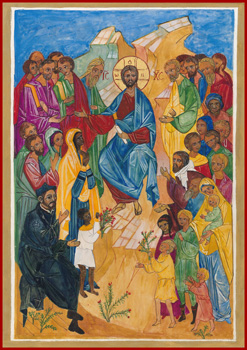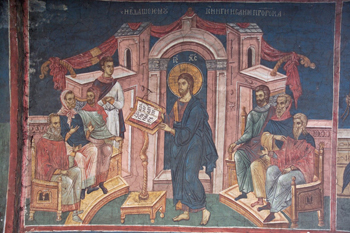For Sunday June 10, 2018
Lectionary Readings (Revised Common Lectionary, Year B)
Genesis 3:8-15
Psalm 130
2 Corinthians 4:13-5:1
Mark 3:20-35
I’ll be honest: I find this week’s Gospel reading troubling and hard. It cuts close to home in ways that hurt, and raises questions I don’t know how to face courageously.
If you’ve read my previous essays, you know that I grew up in a tight-knit immigrant family. My parents left their native India when I was two months old, and raised me in a thickly South Asian community here in the U.S. Like many “second generation” Americans, I have spent most of my life agonizing over my identity. Who am I? What am I? (American or Indian?) Who are my people? To whom do I belong? Where should my cultural loyalties lie?
It’s with this background that I come to the week’s lectionary reading, and find a Jesus who scandalizes his hometown by accusing his religious leaders of blasphemy, and publicly disowning his mother and siblings. Let’s get the obvious over with first: if you need Jesus to be soft and cuddly, this lection is not for you. If you need Jesus to affirm your sense of order, your personal and social boundaries, and your spiritual comfort zones, this lection is not for you. If you need Jesus to make your life decisions less painful and costly, this lection is definitely not for you.
The setting of the text is Nazareth. Jesus has returned home after inaugurating his ministry, and it’s clear from the size and frenzy of the crowds pressing against him that his reputation has preceded him. After all, much has happened since the carpenter's son first left home. The heavens have opened at his baptism. He has survived a forty-day fast in the wilderness. He has driven out unclean spirits, healed the sick, eaten with sinners, chosen his disciples, and declared himself the Lord of the Sabbath.
 |
Through these and other acts, he has mesmerized every crowd he’s come into contact with, stirring up such hope, excitement, and yearning in people’s hearts that they just can’t leave him alone. So they follow him to Nazareth and pour into the house where he’s staying, pressing in so tight that Jesus can’t even lift his hand to his mouth to feed himself.
Needless to say, this state of affairs is more than enough to alarm both his family and the religious authorities. Jesus’s mother and siblings arrive on the scene first, intending to stage an intervention. Mortified by the neighborhood rumors that Jesus has lost his mind, Mary and her other children stand outside the jam-packed house and call for Jesus, hoping in vain to “restrain” him.
The scribes show up shortly thereafter (having come down from Jerusalem to investigate this new teacher) and declare that Jesus is evil and a threat — not a benign healer empowered by God, but a fiend possessed by Beelzebub, “the ruler of the demons.”
It’s too easy for us, having the benefit of historical hindsight, to write off these people who accuse Jesus of insanity and demon possession. As if discernment is a neat and tidy process for us moderns. As if we never mistake evil for good, or better for best, or bravery for insanity. The fact is, neither Jesus’s family nor the scribes from Jerusalem are evil or ill-intentioned. They are earnest people dedicated to maintaining stability during a fraught time. Jesus’s family desires order and peace in the domestic sphere, and the scribes desire order and peace in the religious sphere. Don’t we all? They’re not out to thwart God; they just want to keep things respectable.
Which is why, I think, I find Jesus’s behavior in this lection so upsetting. The Jesus of Mark 3:20–35 is harsh, austere, and impatient. Instead of responding compassionately to the scribes, he shreds their arguments with clever parables, and accuses them of blasphemy against the Holy Spirit — an “unforgiveable” sin. Instead of going out to greet and reassure his mother and siblings, he rejects their interventions, renounces their claims on his life, and trades them in for a new family of his own making.
 |
What is Jesus doing? And why does he do it so impolitely? I don’t know for sure, but I wonder if he’s navigating through the same questions I listed at the start of this essay, the same questions that have caused me such pain and grief as a daughter of immigrants in a bifurcated world: Who am I? What am I? Who are my people? To whom do I belong? Where should my loyalities lie?
Redefining one’s identity — whether in a family or in a religious institution — is a provocative act, and it almost always comes at a price. Some of the most searing and traumatic encounters I’ve had with my family have been around cultural and religious identity, around my longing to share with them the fullness of who I am — both American and Indian, both Christian and progressive, both feminine and feminist.
In this lection, Jesus proves himself even more provocative, and pays a far higher price than I can even imagine. Can you picture the scene? Outside the house stand the insiders — the family, the religious folk, the pious, the careful. They think they have God pinned down. They know what the Holy Spirit is supposed to look like, and Jesus doesn’t fit the bill. Inside the house sit the outsiders — the misfits, the rejects, the tax collectors, the prostitutes. They’re not interested in dogma or piety; they just need love and they seem to have found it in a man who heals the sick and feeds the hungry. And in the midst of them? Smack in the center of the sick, the insane, the deviant, the hungry, the unorthodox and the unwashed? There sits Jesus, saying, “This. This is my family.”
If we’re not shaken, then we’re not paying attention. Jesus isn’t calling for surface change here; he’s dividing the house. He’s burning things down. He’s going for the deep, the institutional, and the systemic. Outside is in, and inside is out, and the people least likely to get it are the ones who consider themselves the most knowledgeable, the most “churchy,” and the most spiritually stable. I don’t know about you, but when I think about who the blasphemers are in this story, I tremble. It is entirely possible (who knew?) to look God’s wild, disturbing, unpredictable Spirit in the eye and call that loving Spirit insane or demon-possessed. Let’s be careful at all times with our certainties.
| |
As I wrote at the beginning, I find this Gospel reading very difficult. When I think of Mary standing outside that house, waiting for her son, my heart breaks. I think of my own mother, and of the many times I have kept her waiting. I think of my son, and of how devastated I would feel if he renounced me.
It helps to imagine that this moment of breakage and rupture costs Jesus something dear. He knows he is Mary's son. He knows the agony of letting her go. But he knows that he's God's Son first, and that his divine identity must trump all others. Still. I hope that it's with a secret lump in his throat that he bids his family goodbye.
At the same time, I can’t help but imagine what it must have felt like to be inside the house with Jesus that day. I know intimately and well, as perhaps you do, the hunger to belong, to have someone safe and loving to belong to. Regardless of our circumstances, we all know what it’s like to yearn for someone who can hold all of who we are, and love us still, without flinching. That’s exactly what Jesus does for the crowds that day. He invites them in, he asks them to stay, and he makes them family.
Yes, Jesus divides the house, and that process hurts. But he doesn’t divide it to make us homeless. He divides it to rebuild it. To make it more spacious, more welcoming, and more beautiful. The Spirit of God is neither insane nor evil; the Spirit completes the good work he begins. His will be a house of healing for the whole world.
Image credits: (1) Jesuit Institute London; (2) Icons and Their Interpretation; and (3) Saint Andre Bessette Catholic Church.





